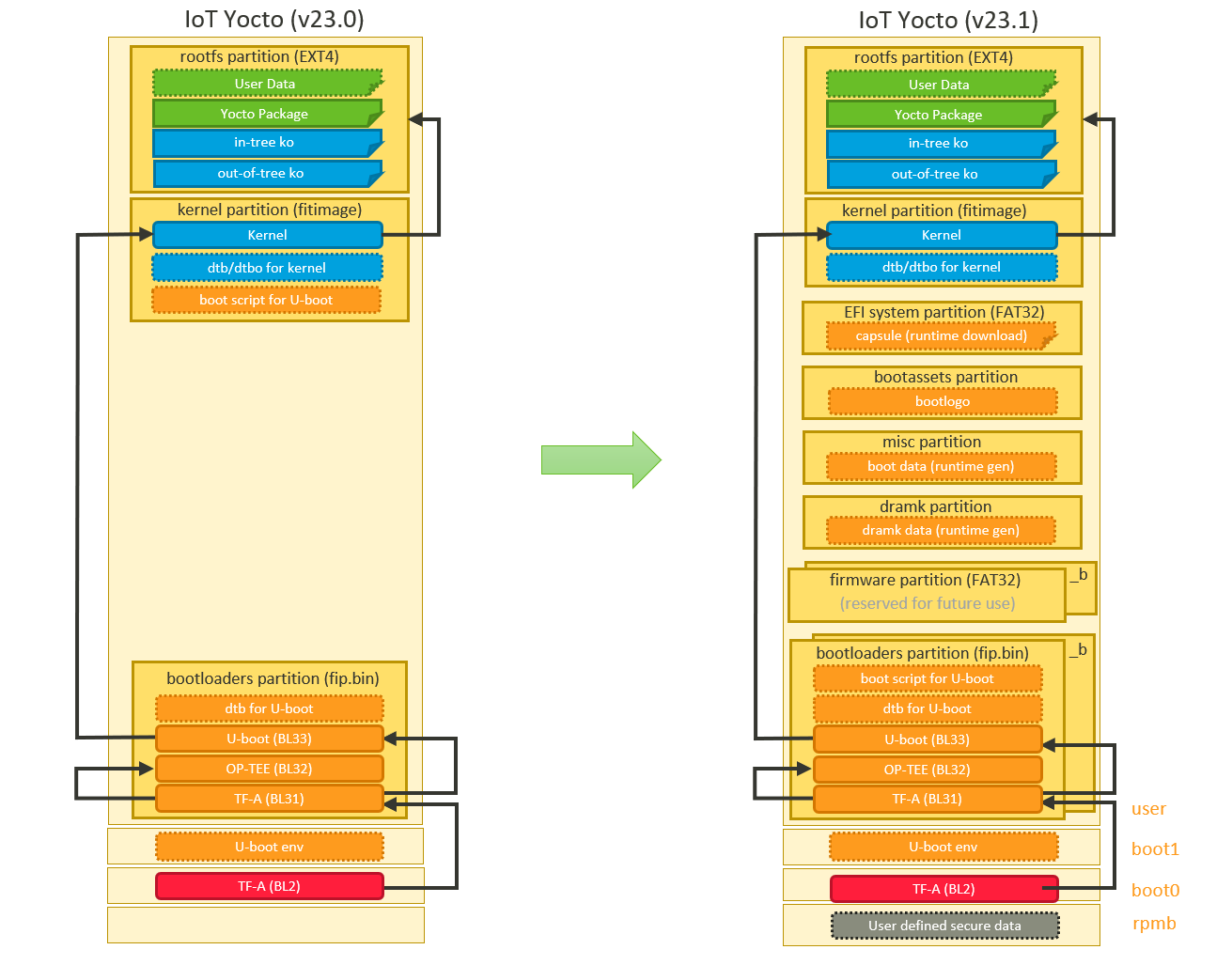Partition Layout
Changes since V23.0
Since the V23.0 release, the partition layout has undergone significant updates, as shown in the following figure:

The following list summarizes these changes:
We added several new partitions to accommodate future integration of additional features, including A/B firmware updating, Over-the-Air (OTA) upgrading, and more.
Although unrelated to the partition layout, we relocated the boot script from kernel fitImage to
fip.bin(bundled with U-Boot binary) to enhance the speed of kernel loading.
Partitions in Detail
To better understanding the partition layout, we classify partitions in following categories:
A “firmware” defined partition is a partition defined and controlled by the board firmware (bootloader) vendors. This kind of partition is usually crucial to the firmware to be functional. If the partition is absent, or the partition contains corrupted data, the firmware may fail and is unable to boot the board. Please consult the vendor for advice before making any change to the partitions in this category.
An “OS” defined partition is a partition defined and controlled by the operating system vendors or the system integrators. This type of partition stores the data required for booting an operating system. OS vendors or system integrators can adjust the order, size, or number of partitions to meet their specific requirements.
The following table describes the partition scheme for Genio EVK boards using embedded MultiMediaCard (eMMC) storage:
Category |
Partition Label |
Size |
Partition Image |
Remark |
|---|---|---|---|---|
OS |
rootfs |
OS dependent |
N/A |
Rootfs generated by IoT Yocto |
OS |
kernel |
32MB |
fitImage |
IoT Yocto kernel |
OS |
EFI system partition |
100MB |
capsule.vfat |
Reserved to be consistent with EBBR, and currently not required for booting IoT Yocto. It also acts as a temporary area for storing EFI capsules during firmware update. |
Firmware |
bootassets |
32MB |
bootassets.vfat |
Static bootloader data such as boot logos |
Firmware |
misc |
1MB |
N/A |
Support A/B firmware update feature |
Firmware |
dramk |
512KB |
N/A |
One-time programming for per-board DRAM calibration data |
Firmware |
firmware_b |
32MB |
N/A |
Preserved for future use |
Firmware |
firmware |
32MB |
N/A |
Preserved for future use |
Firmware |
bootloaders_b |
4MB |
fip.bin |
The content in bootloaders and bootloaders_b should be the same initially |
Firmware |
bootloaders |
4MB |
fip.bin |
Containing fip.bin, which consists of BL3* loaders (BL31, BL32, BL33) |
Firmware |
mmc0boot1 |
HW dependent |
u-boot-env.bin |
Runtime generated by genio-flash tool based on u-boot-initial-env plain text file and additional configurations |
Firmware |
mmc0boot0 |
HW dependent |
bl2.img |
2nd stage bootloader based on Trusted-Firmware-A |
Firmware |
rpmb |
HW dependent |
N/A |
Storage for user defined secure data |
Partition Layout Creation
The Genio image flash tool genio-flash uses wic generated image for flashing storage. The wic image packs a partition table and content of all partitions, thus you can use it to create the partition layout on the target board with a single flash operation. Some individual images for partitions used for creating wic image are also included in the image tarball, so an user can also flash specific partition with corresponding image (by specifying partition name in genio-flash command option).